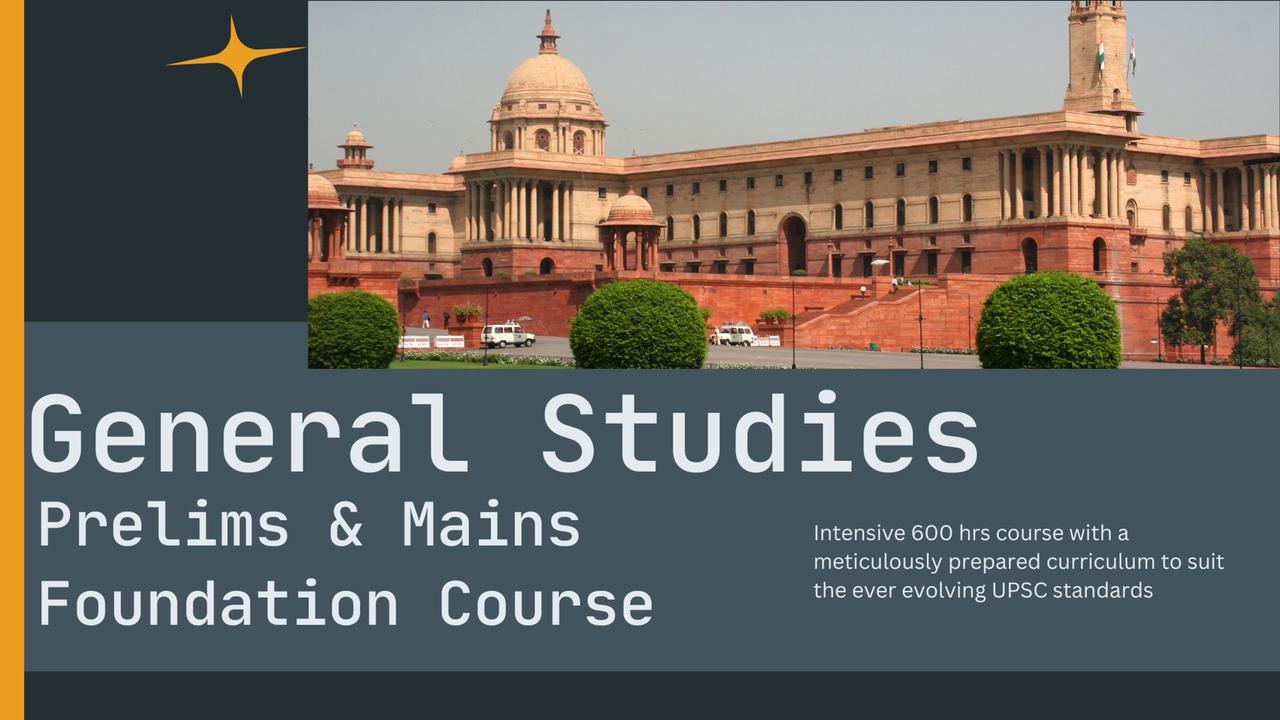
About Course
General Studies Foundation Playlist
General Studies Foundation Course Prelims Cum Mains Covers Topic
- Prelims Examination
- Mains Examination
Prelims Examination :-
General Studies (GS) is a crucial component of the Civil Services Exam, but many aspirants struggle with it due to the lack of a well-defined strategy, confusion over the syllabus, and the changing pattern of questions. To tackle GS effectively, aspirants need meticulous planning, both during preparation and the exam.
One common myth about GS is that it doesn’t have a defined syllabus. However, previous years’ questions indicate that UPSC is looking for well-informed candidates with broad awareness and understanding of current affairs and developments. To start with, aspirants should study all the NCERT books from class VI to X, and for History, Geography, Economics, and Polity, the NCERT books of class XI and XII must also be studied. While reading NCERTs alone is not sufficient, it creates a solid foundation for GS preparation.
The nature of the GS question paper can be summarized as 50% from NCERT books and 50% from newspapers. While this statement shouldn’t be taken literally, it means that 50% of the questions can be answered with a strong foundation in basics, while the rest are related to recent events and can be gleaned from reading newspapers.
In recent years, there has been an increasing proportion of “General Awareness” questions in the Preliminary exam. While some questions can be categorized as “Current Affairs,” many cannot. Aspirants must take General Studies Paper-II (CSAT) seriously, as a minimum of 33% marks are required to clear the Preliminary Exam.
In terms of the subject-wise breakup, the questions in the 2021 Prelims were multidimensional and could be considered part of more than one subject, making subject-wise classification difficult in most cases. However, the importance of Indian Polity has increased tremendously in both the Preliminary and Main examinations. The questions are straightforward and can be easily answered with careful study. Constitutional Developments, Fundamental Rights, Directive Principles of State Policy (DPSP), Union Government, Judiciary, Amendments, Local Governments, Federalism, and the Election process are the topics from which questions are generally asked. The difficulty level of Polity questions ranged from easy to moderate, and many questions were influenced by current happenings.
Overall, a well-planned and comprehensive approach to GS preparation is crucial for success in the Civil Services Exam.
Mains Examination :-
General Studies Paper 1
(History, Culture, Geography and social Issues)
Studying history is very important for civil Servants, because it makes us understand the blunders we have committed in the past. The History portion of the General Studies exam covers not just the Freedom struggle, but also the Post-Independence era of India, and a comprehensive understanding of Indian Culture from ancient to modern times. Additionally, World History since the 18th century is also a significant part of the syllabus, making the coverage of the subject vast and significant, with expected questions worth 70-80 marks. To prepare for this section, it is recommended to thoroughly study NCERT Books, especially old editions for Modern History and Contemporary World History.
The exam also covers Social Issues like women's rights, population, urbanization, poverty, globalization, and secularism. Familiarity with various government schemes is also essential. With questions worth 75-85 marks expected from this area, one should focus on simple concepts and a
deeper understanding of multidisciplinary issues.
Geography is a familiar subject with which we all have acquaintance since our school time. Geography is a vital part of GS and overlaps with other subjects. It covers the world's physical geography, including India, geophysical phenomena, and distribution of natural resources, with questions worth 90-100 marks expected from this section. The majority of questions are related to the geography of India, with a clear focus on Climate change and its impact. The exam consists of 20 compulsory questions, divided into two types: 10 questions of 15 marks each with a 250- word limit and another 10 questions of 10 marks each with a 150-word limit. To perform well in this section, one must have a good grasp of geographical concepts and their practical applications.
General Studies Paper 2
(Indian Polity, Constitution and Governance, International Relations, Social justice)
The paper on Indian Polity, Constitution and Governance, International Relations, and Social Justice may seem easy, but candidates are struggling to score well. The first section focuses on not just pure Constitution-related questions but also the functioning of the Constitution.
Candidates are expected to provide critical analysis and suggest alternative policy measures. This section may contain 13-14 questions worth 190- 200 marks, and reading newspapers can be beneficial.
International relations mainly revolve around India's relationships with its neighbouring and other countries, as well as international institutions and agencies. Questions in this section are expected to be straightforward and based on current events. This section may contain questions worth 50-60 marks.
The paper consists of 20 compulsory questions divided into two categories. The first category has ten questions, each worth 15 marks with a word limit of 250, while the second category has ten questions, each worth 10 marks with a word limit of 150.
General Studies Paper 3
(Technology, Economic Development, Security, Bio-Diversity, Environment and Disaster Management)
Indian Economy is not just about data and graphs. The subject focuses much about the concepts and principles which governs production distribution etc. The Indian Economy and its relationship with the world economy are the most significant aspects of this paper, with most questions centered around this topic. Agriculture and food processing industries are receiving more attention in recent years, making up almost half of this section. Aspirants can expect 8-10 questions worth 100-125 marks from the Economy section.
Internal Security is another critical area, and UPSC is asking questions directly from the syllabus. However, aspirants must have a comprehensive understanding of buzzwords and current events related to cyber security, border management, insurgency, Naxalism, etc. Usually, 4-5 questions worth 50-60 marks can be expected from this section.
The Biodiversity, Environment and Disaster Management section requires a broad understanding of problems and solutions. Theoretical knowledge is not as critical in this area, and most questions are based on current issues, conferences, agreements, etc. Aspirants can expect 4-5 questions worth 60-70 marks from this section.
Science and Technology is another area that requires attention, with a focus on recent developments in India, such as Space, Biotech, Robotics, and Nanotech. Newspaper reading is essential in this area, and aspirants need to pay close attention to facts. UPSC is trying to stay current, so knowledge of any recent technological advancements is necessary. Typically, 3-4 questions worth 30-40 marks can be expected from this section.
The paper consists of 20 compulsory questions, with 10 questions worth 15 marks each, with a word limit of 250, and another 10 questions worth 10 marks each, with a word limit of 150.
General Studies Paper 4
(The Ethics, Integrity, and Aptitude)
The Ethics, Integrity, and Aptitude paper is the most fascinating and rewarding of all the General Studies papers. Most of the questions do not require formal knowledge as they are based on practical knowledge and common sense. The first part of the paper, worth 120-130 marks, focuses on understanding the various terms mentioned in the syllabus, as well as the ideas and thoughts of significant thinkers and philosophers. The second half of the paper involves case studies, where candidates must place themselves in a given situation and explain what they would do while considering the ethical and legal issues at hand. This section aims to assess the practical understanding of the candidate. The entire paper is relatively easy, but candidates may require some guidance to answer it logically. Answer writing ability is also crucial in this section. The paper consists of 19 compulsory questions, with six questions worth 20 marks each, with a word limit of 250, and 13 questions worth 10 marks each, with a word limit of 150.
Student Ratings & Reviews


